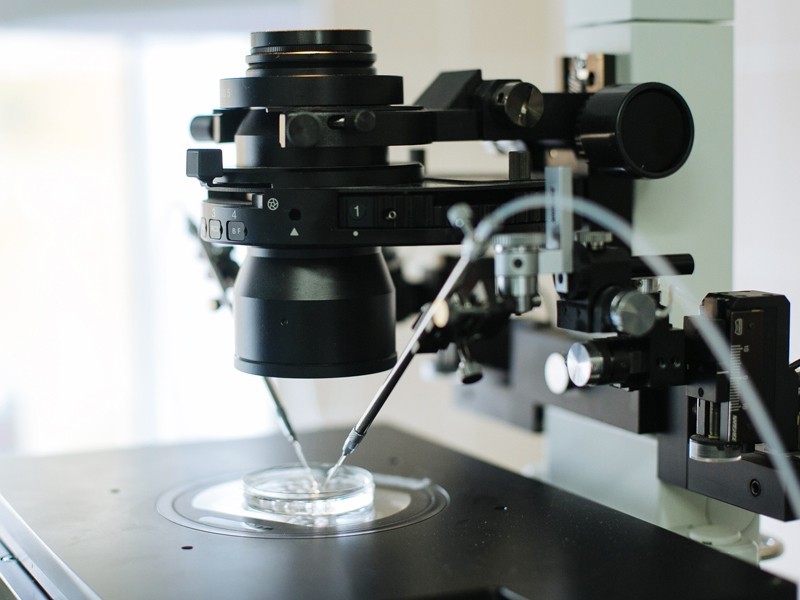Spermogram

The number of infertile married couples has been growing continuously for 20 years. There is an erroneous belief that most of them cannot have children due to the women’s health problems. But according to research, male infertility occurs no less than female infertility, in 50% of cases. Therefore, we do not have to underestimate men’s health problems.
Almost every infertile couple must undergo a full diagnosis of both partners when planning a pregnancy. The most effective and simplest test for diagnosing male health is a spermogram.
A spermogram is a laboratory analysis of a man’s semen (ejaculate), which is done to estimate the quality of the sperm and the male fertilization function.
Ejaculate is the fluid that is released during ejaculation. It is made up of sperm (motile cells) and semen.
A spermogram determines the number of spermatozoids, their quality, motility, type, pathological and gene mutations. The overall semen count, viscosity, color and the ratio of healthy sperm in semen is also determined by it.
Who needs a spermogram?
It is essential to do before planning a pregnancy. If a couple cannot get pregnant within one year, it is also worth taking a test. There are not so many indications for the delivery of spermogram. Doctors recommend taking a spermogram prophylactically to all men over 30 years old, once a year, to control their health. Spermogram can be done when using assisted reproductive technologies for fertilization or for donation to a sperm bank.
Also, the analysis can be used to determine various diagnoses: prostatitis, varicocele, or hormonal disruptions.
Preparing for sperm donation
A man must prepare for delivery for the test to be effective, and the results are reliable. Sometimes, a physician may prescribe individualized training recommendations.
But there are general rules that must be followed:
- You need to refrain from intercourse for 5 days before delivery . This will increase your sperm count. But you should abstain for no more than 7 days;
- within 7 days, it is worth giving up fatty, spicy and junk food. Also exclude alcohol, coffee and cigarettes;
- reduce physical activity, do not go to the gym, sauna and steam bath. Do not take hot baths;
- cure all infectious diseases that cause inflammation and fever;
- if it is possible, stop taking medications within 24 hours: antibiotics, antidepressants, psychotropic, narcotic analgesics and anti-inflammatory drugs;
- eliminate stress factors and psycho-emotional arousal. They can cause disruptions in the hormonal balance, and, accordingly, affect the state of the sperm.
How to take the material?
Sperm is a rather peculiar material and it is sensitive to external conditions. With prolonged storage, the quality and vitality of the sperm decreases. Therefore, it is possible to pass it only by appointment and in laboratory conditions, from where it will immediately go for research.
Material is rented with the help of masturbation. For this, laboratories have a special room where appropriate conditions are created. The man is given a special sterile vessel in which he collects material. He hands it over to the laboratory assistant, who immediately proceeds to the analysis. It is important for the man to collect all the ejaculate in a container, since different sperm portions may have different sperm counts, and the loss of a part can lead to inaccurate analysis. The result can be obtained within a day.
For the most accurate results, it is recommended to take a spermogram 2 times, within 2 weeks. If the results differ, you will need to take it again.
Normal sperm counts
If all the rules for the preparation and delivery of a spermogram are followed, then good results look like this:
- The volume of the material is 3-6 ml.
- Color – white-gray, with a yellow tint
- pH 7.2-.76
- Viscosity – 6.0-6.6
- Agglutination – absent
- Ejaculate dilution – from 10 to 40 minutes
- Sperm count – more than 20 million in 1 ml.
- Alive – 90-95%
- Active – more than 60%
- Slightly mobile – 10-20%
- Pathologically altered – no more than 20%
- The presence of erythrocytes – from 0 to 2 in the field of view
- Leukocytes – 3-5 in the field of view.
Also, the laboratory assistant additionally conducts a MAR test, which determines the presence of antisperm antibodies for the diagnosis of immunological infertility. Normally, antibodies should not be present.
Reasons for the deterioration of spermogram results
- Genetic diseases and pathologies;
- toxic effects, alcohol, medicines, radiation, cigarettes, drugs, chemicals;
- harmful effects of compounds of lead, mercury and other heavy metals;
- frequent infectious and inflammatory diseases of the genitourinary system (prostatitis, vesiculitis), for example, chlamydial etiology;
- varicocele – enlargement of the veins of the testicles;
- disorders in hormonal balance. Additionally, you can check FSH, LH, testosterone and prolactin;
- violation of the patency of the vas deferens, as a result of injury or other reasons;
- unhealthy lifestyle and excess body weight.
All of these reasons, alone or in combination, can affect sperm quality. Some of them cannot be fixed, for example, genetic ones. But sometimes, you can improve the results of the spermogram, and increase the chances of fertilization.
How to improve sperm results
Following simple rules, in just 3-4 months, you can increase the number of healthy and active sperm, which will allow you to fertilize an egg and give a birth to a healthy baby.
- Diet. The food which we eat directly affects our health and our sperm as well. Therefore, improving its quality, you need to change your diet in a healthy direction. You need to increase the amount of protein, fresh vegetables and fruits. Refuse coffee and strong tea. Eliminate fatty, fried and spicy foods from the diet. There are also fewer fast foods and dry snacks. Don’t eat a lot of sugary foods and various salty snacks. Your diet should be complete, balanced and varied;
- if you are obese, you need to lose weight. This should be done with diets and moderate exercise. Do not do heavy physical exercise;
- alcohol toxic effect on sperm. Therefore, you need to completely eliminate alcohol for the period of treatment;
- exclude smoking. Tobacco affects sperm mobility, and can also provoke pathological changes;
- it is equally important to avoid stressful situations, which have a bad effect on sperm production and potency in general;
- do not abuse procedures with high temperature: bath, sauna, jacuzzi. Overheating of the testicles has a negative effect on sperm mobility.
It is important to monitor your sexual health, undergo preventive examinations, not to self-medicate infectious and inflammatory diseases. At the first manifestations, immediately consult a doctor. After all, the treatment started in the early stages increases the chances of a quick and complete recovery.

